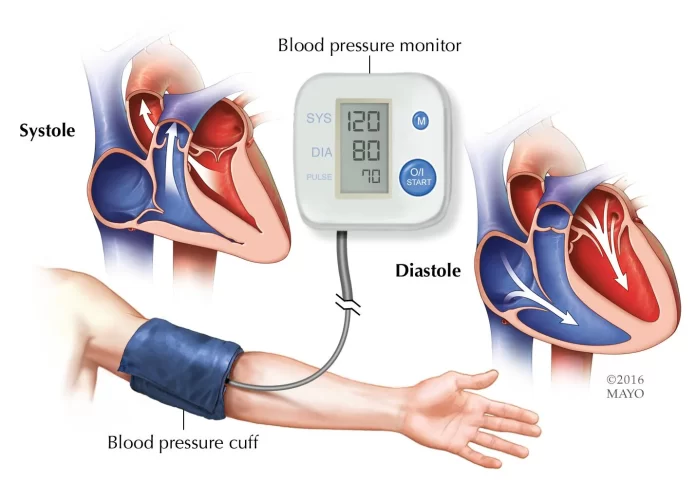High Blood Pressure/Hypertension.
High blood pressure, or hypertension, is a common yet serious highs health condition where the force of the blood against the walls of the arteries is consistently to. This increased pressure can lead to various health issues, including heart disease, stroke, and kidney damage. Despite its prevalence, high blood pressure often goes unnoticed because it typically has no symptoms. Therefore, understanding its causes, treatment options, and preventive measures is crucial for maintaining long-term health.
Causes of High Blood Pressure
High blood pressure is classified into two types: primary (essential) hypertension and secondary hypertension.
1. Primary Hypertension: This form of hypertension develops gradually over many years and is not usually attributed to any specific cause. However, several risk factors contribute to its development:
– Genetics: Family history of high blood pressure increases the likelihood of developing the condition.
– Age: Blood pressure tends to rise with age due to changes in blood vessel elasticity.
– Gender: Men are generally more likely to develop high blood pressure at a younger age than women. However, the risk for women increases after menopause.
– Lifestyle Factors: Unhealthy lifestyle choices play a significant role, including poor diet (high in salt, fat, and cholesterol), physical inactivity, excessive alcohol consumption, and smoking.
2. Secondary Hypertension: This type of hypertension is caused by an underlying condition or medication. Causes include:
-Kidney Disease: Conditions affecting the kidneys, such as chronic kidney disease, can increase blood pressure.
– Hormonal Disorders: Disorders such as hyperthyroidism or Cushing’s syndrome can lead to elevated blood pressure.
– Medications: Certain drugs, including birth control pills, nonsteroidal anti-inflammatory drugs (NSAIDs), and decongestants, can cause secondary hypertension.
– Sleep Apnea: Obstructive sleep apnea can contribute to high blood pressure due to intermittent drops in blood oxygen levels during sleep.
Treatment of High Blood Pressure
Managing high blood pressure often requires a combination of lifestyle changes and medication. The goal of treatment is to lower blood pressure to a safe level and prevent complications.
1. Lifestyle Modifications:
– Diet: Adopting a heart-healthy diet, such as the DASH (Dietary Approaches to Stop Hypertension) diet, is beneficial. This includes eating plenty of fruits, vegetables, whole grains, and lean proteins while reducing sodium intake.
– Physical Activity: Regular exercise helps lower blood pressure. Aim for at least 150 minutes of moderate-intensity exercise per week, such as brisk walking or cycling.
– Weight Management: Maintaining a healthy weight can significantly impact blood pressure. Losing excess weight, if necessary, can help lower hypertension.
– Limiting Alcohol and Quitting Smoking: Reducing alcohol intake and quitting smoking can improve cardiovascular health and help manage blood pressure.
– Stress Management: Chronic stress can contribute to high blood pressure. Techniques such as meditation, deep breathing exercises, and relaxation therapies can be beneficial.
2. Medications:
– Diuretics: These help the body remove excess sodium and fluid, which can lower blood pressure.
– ACE Inhibitors: These medications help relax blood vessels by blocking the formation of a hormone that narrows blood vessels.
– Angiotensin II Receptor Blockers (ARBs): ARBs block the action of a hormone that narrows blood vessels.
– Calcium Channel Blockers: These prevent calcium from entering the cells of the heart and blood vessel walls, which helps relax and widen blood vessels.
– Beta-Blockers: These reduce the workload on the heart and help it beat more slowly and with less force.
In some cases, a combination of medications may be necessary to achieve optimal blood pressure control. Regular monitoring and follow-up with a healthcare provider are essential to adjust treatment plans as needed.
Prevention of High Blood Pressure
Preventing high blood pressure involves adopting healthy lifestyle habits and managing risk factors effectively. Here are key strategies to prevent the onset of hypertension:
1. Healthy Eating Habits:
-Reduce Sodium Intake: Limit salt in your diet to help control blood pressure. Opt for herbs and spices to flavor foods instead of salt.
– Increase Potassium Intake: Potassium helps balance sodium levels in the body. Foods rich in potassium include bananas, oranges, and spinach.
2. Regular Physical Activity:
– Stay Active: Incorporate regular physical activity into your routine. Activities like walking, swimming, and cycling can help keep your heart healthy and blood pressure in check.
3. Maintain a Healthy Weight:
– Weight Management: Achieve and maintain a healthy weight through a balanced diet and regular exercise. Even a modest weight loss can have a significant impact on blood pressure.
4. Limit Alcohol and Avoid Smoking:
– Moderate Alcohol Intake: If you drink alcohol, do so in moderation. For women, this means up to one drink per day, and for men, up to two drinks per day.
– Quit Smoking: Smoking damages blood vessels and raises blood pressure. Quitting smoking can have immediate and long-term benefits for heart health.
5. Monitor Blood Pressure Regularly:
– Regular Check-Ups: Routine blood pressure checks can help catch any changes early. Home blood pressure monitors can also be useful for tracking your readings.
6. Manage Stress:
– Stress Reduction Techniques: Engage in activities that reduce stress, such as yoga, meditation, or hobbies that you enjoy.
High blood pressure is a significant health concern that requires careful management to prevent serious complications. Understanding its causes, pursuing effective treatments, and implementing preventive measures are key to maintaining good health. By adopting a healthy lifestyle, following medical advice, and staying vigilant about blood pressure levels, individuals can significantly reduce their risk of developing hypertension and its associated health issues. Regular communication with healthcare providers and proactive management are essential for long-term well-being.




























